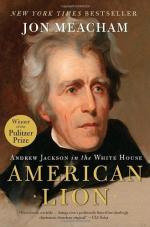|
This section contains 322 words (approx. 2 pages at 300 words per page) |
Andrew Jackson
Andrew was named major general of Tennessee militia during the War of 1812; in September 1814 he defeated the Creek Indians, who were British allies, at Horseshoe Bend. Commissioned a major general in the regular army, he stormed Pensacola, FL, and then routed the British in the Battle of New Orleans.
He was named the South's hero, known everywhere as Old Hickory; he was elected to the Senate, and narrowly lost the presidency to John Quincy Adams when the election was thrown into the House of Representatives. He later was the election of 1828; he set a precedent for the `spoils system' by filling hundreds of offices with his supporters.
As president, he was torn between the issues of slavery, nullification, and states' rights; in the name of the latter he suppressed the Bank of the USA. And he was remembered for his relentless removal of many Indians to W of the Mississippi.
In the long run, Jackson's main legacy was the new strength his personality bequeathed to the office of the presidency for the future. Also, the new Democratic Party formed around him and his popular image as champion of the common man, even though he himself had little patience with the wishes of most people. On leaving the presidency, he retired from public life and spent his declining years at `the Hermitage' and died in 1845.
|
This section contains 322 words (approx. 2 pages at 300 words per page) |


